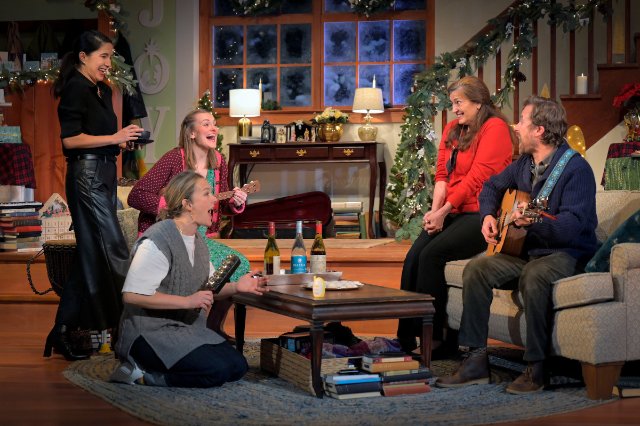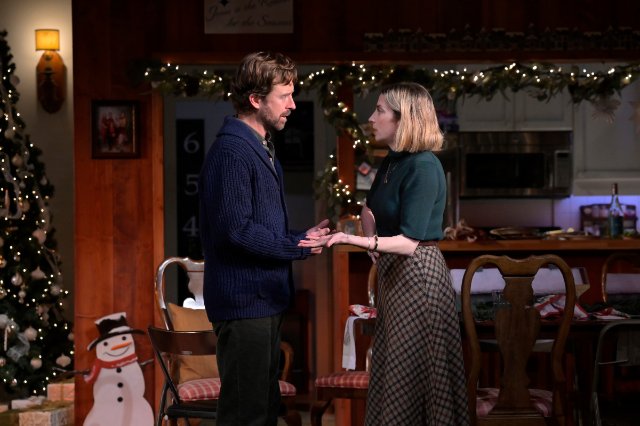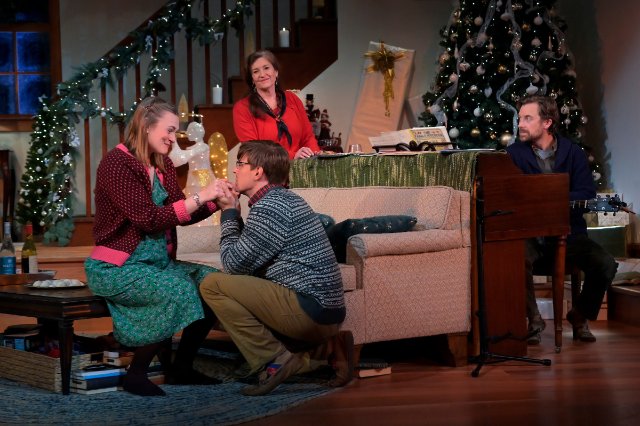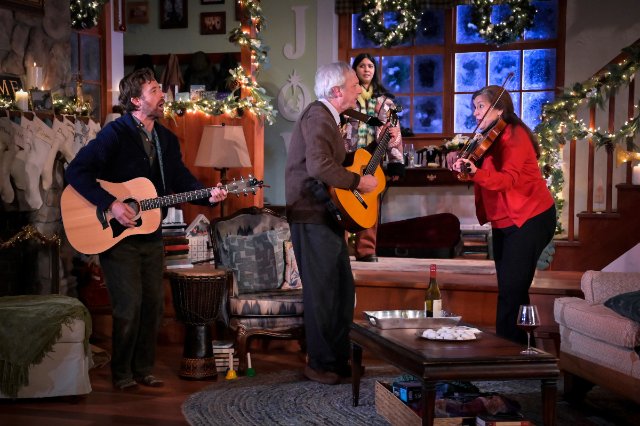Cult of Love at Berkeley Rep
Awesome Treatment of Leslye Headland's Seventh Deadly Sin - Pride
By: Victor Cordell - Feb 02, 2024
It all starts in Kumbaya spirit. Adult children and their spouses gather with their parents at the Dahl family homestead, festively fashioned for Christmas. Smiling and enthusiastic, they sing holiday and folk traditionals like “A’Soulin” and “Children, Go Where I Send Thee.” Later, in memory of a trip to the Great Smokies, the four children sing a beautifully harmonic “Oh, Shenandoah.” But like their erroneous connection with that song, which actually relates to an Indian chief, the familial harmony is an illusion, as it occurs almost solely when they join in song.
Playwright Lesley Headland has crafted a wildly entertaining and stunningly searing indictment in “Cult of Love,” the final chapter in a seven-play series. Trip Cullman, a frequent collaborator with Headland, directs a stellar cast to a masterful and captivating production. Each play addresses one of the Seven Deadly Sins, with this installment focusing on pride, which in some ways can be considered a master sin, as it can lead to committing most of the others.
Bill and Ginny Dahl fervently identify themselves as “Christians” and raised their children accordingly. Christmas takes on special meaning for them, as the children ritually return home for the holiday; sing carols; eat lamb dinner prepared by the father; and take the obligatory photo of the four kids together smiling.
But ultimately, the traditions become disingenuous as children gain their own sense of agency, and gaping fissures appear in the relationships. The uber-talented and academically accomplished Mark has settled for a government job, married a Jewish girl and seemingly repudiated Christianity. Johnny is a recovering heroin addict and unmarried. Evie is a lesbian and in a same-sex marriage. Finally, Diana has become a doctrinaire fire-and-brimstone zealot who castigates and alienates those around her with her judgmentalism and rigidities.
Parents always hope to love their children, but the elder Dahls must confront children whose actions contradict the parents’ beliefs. Not exactly what the parents hoped for. But like Christian fundamentalists, Ginny's belief-driven system extends beyond the moral and existential, so that beliefs trump facts in the realm of science. Although Bill has shown evidence of mental deterioration, she refuses to accept the obvious, which becomes a major source of friction in the family.
The partiality of the parents is felt by some of their children, to which Bill argues that he loves everyone, which may be interpreted as he feels no more for his children than for others. He then qualifies his statement by noting that he hated his father, which suggests that generational antipathy is not limited to this immediate family.
Headland makes an interesting choice of surnames for the family in question, Dahl. It is a homophone of doll, which is a human imitation, a counterfeit. Are the Dahls a family in name alone?
Personality traits become more manifest and unidirectional as the action unfolds. One exception is Mark, who has an episode that either represents retrogression or convenient and skilled acting. Siblings inflame old wounds and new with remarkable candor.
So how does this all relate to pride? The playwright’s thesis is that certainty of belief breeds pride. We become self-referential and exclusionary when we feel that we have all of the right answers. It may not be too difficult for the reader to intuit the primary source of the sin in this drama. Of course, a further question is begged – is a person who actually does have the right answers prideful?
While the script offers powerful messages, they are also delivered with consummate skill. Acting is superb by an ideal ensemble cast. Talking overlap and even competing conversations are deftly executed. Although the conflict in this play is pronounced, it offers considerable levity, with players earning laughs from pedestrian lines. Major contributions are added by the creative designers, with a special nod to Scenic Designer Arnulfo Maldonado, whose massive and detailed set provides beauty, function, and authenticity. This play is highly recommended.
“Cult of Love” is written by Leslye Headland, produced by Berkeley Repertory Company, and is performed on its stage at 2025 Addison Street, Berkeley, CA through March 3, 2024.






